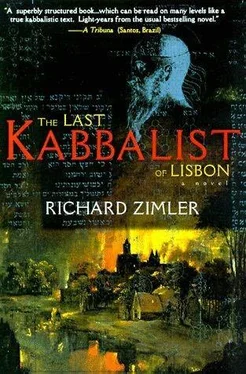Richard Zimler - The Last Kabbalist of Lisbon
Здесь есть возможность читать онлайн «Richard Zimler - The Last Kabbalist of Lisbon» весь текст электронной книги совершенно бесплатно (целиком полную версию без сокращений). В некоторых случаях можно слушать аудио, скачать через торрент в формате fb2 и присутствует краткое содержание. Год выпуска: 1998, Издательство: Arcadia Books, Жанр: roman, Исторический детектив, Философия, на английском языке. Описание произведения, (предисловие) а так же отзывы посетителей доступны на портале библиотеки ЛибКат.
- Название:The Last Kabbalist of Lisbon
- Автор:
- Издательство:Arcadia Books
- Жанр:
- Год:1998
- ISBN:нет данных
- Рейтинг книги:5 / 5. Голосов: 1
-
Избранное:Добавить в избранное
- Отзывы:
-
Ваша оценка:
- 100
- 1
- 2
- 3
- 4
- 5
The Last Kabbalist of Lisbon: краткое содержание, описание и аннотация
Предлагаем к чтению аннотацию, описание, краткое содержание или предисловие (зависит от того, что написал сам автор книги «The Last Kabbalist of Lisbon»). Если вы не нашли необходимую информацию о книге — напишите в комментариях, мы постараемся отыскать её.
The Last Kabbalist of Lisbon — читать онлайн бесплатно полную книгу (весь текст) целиком
Ниже представлен текст книги, разбитый по страницам. Система сохранения места последней прочитанной страницы, позволяет с удобством читать онлайн бесплатно книгу «The Last Kabbalist of Lisbon», без необходимости каждый раз заново искать на чём Вы остановились. Поставьте закладку, и сможете в любой момент перейти на страницу, на которой закончили чтение.
Интервал:
Закладка:
His hands twirled up and around, quoting Uncle: “You must knock upon yourself as upon a door. It is there where you will find Him if He still exists for you.”
I have waited for a reply to my rapping these many years. Apparently, one must play the ever-willing woodpecker to this hard-of-hearing God, and I simply haven’t the beak.
So maybe I have found that secular landscape I predicted so many years ago. The one toward which I sense the world is moving, with neither rabbis nor priests, populated only by mystics and non-believers. Which one of these groups will finally win the throne of my heart, I cannot say.
My daughter, Zuli, is eighteen now, wants to be a scribe like Aunt Esther. But I see more of Reza in her. Naturally aristocratic, with passionate eyes that dance when she talks. And when she’s angry, she intimidates me with the lambent glare she used to practice in looking glasses.
Ari, who is sixteen, has a strong build, my wife’s curly black hair, Uncle’s intelligent and penetrating eyes. He has studied to be an illuminator and could make a fine artist one day. But he’s dreamed of sailing off to adventure in the New World since he was a child.
“A Jewish manuscript illuminator in the jungles of Brazil would be like a matzah on the moon,” I’ve always told him.
The other day, he came up with this reply: “But some of the Indians there are circumcised. Tu Bisvat says they’re Jews.”
Sounds a little like me as a young man, no? I wonder what Uncle would make of him. I suppose that if he really wants to go to Brazil, maybe he should become a mohel.
The loss of Judah and Uncle condemned my mother to a life on the margins of emotion. She began sewing garments for the Turkish aristocracy in Constantinople and took impeccable care of the fruit store we opened here, but shied away from all gestures of approach. Conversation, even with Aunt Esther, came to her with difficulty. In the early morning, I caught her several times standing vigil over my bed with the inhuman stoicism of a sculpted goddess on a ship’s prow. Whenever I needed to voyage far from home, she would pat my hand, then turn quickly away, as if it were already too late to hope for my return. Prayers and chants only made her anxious. Henbane helped some. She died during Passover almost eight years ago.
As for Aunt Esther, she and I reconciled years ago, right after Diego’s death, in fact. Why should I have kept a grudge against her and Afonso Verdinho? Had I the right to deny her whatever companionship the world could still give her? Just before we left for Constantinople, he rode into the Little Jewish Quarter bearing a gold engagement ring. Just like a cavalier in some Arabian legend. They were married when we reached Turkish shores.
So, as my own life should prove, love is not always limited to a single object. And I’ve no doubt that Aunt Esther loved Uncle and would have given up her life for his. Once, while she was bathing, I opened the lid of her silver locket and found several of Uncle’s long gray hairs. I stole a single strand and ate it.
Esther’s a very old lady now, nearing seventy. But her work as a scribe in Hebrew, Arabic, Persian, Castilian and Portuguese continues to be without equal. She and I recently completed a copy of “The Conference of the Birds” for Sultan Suleiman the Magnificent, may God bless him each and every day. No notes or drawings were left to me from my birdwatching expeditions back in the hills beyond Lisbon, but my Torah memory is still complete enough to gift me with the curve of a crane’s beak and the tone of an owl’s gorget.
The peacocks I included were of Uncle’s design. I like to think that he would be proud of our artistry.
Cinfa. Life has not been easy for her. No sooner was she gifted with a baby girl named Mira six years ago than did she become a widow. Her husband was an eye doctor from Alexandria. A lean and soft-skinned man, with the kindly look of someone who always forgives.
And yet, we soon learned that he drank anise seed aqua vitae like a Greek sailor. And that he didn’t like that I educated his wife in Torah and Talmud. None of this was evident before their marriage. I’d quite forgotten about masks after leaving Lisbon.
When Cinfa was seven months pregnant, he beat her with a cane across the face. “Your sister corrected my Sabbath prayers,” he told me after I’d seen the tender blue and yellow bruises puffing from her eyes and cheeks. His tone implied: I had to do it.
“As well she should have, you lout!” I replied. “The Sabbath is more important than your skinny pride!”
He apologized because of my spiritual standing as an eccentric but learned kabbalist in the community, but I saw in his defiant eyes that he was hardly repentant. I’m not much of a fighter and resorted to trickery. While I blessed my hand over his head in feigned forgiveness, I kicked him so hard in the balls that he writhed on the ground for a good five minutes. I screamed, “And if you ever do it again…!”
When I explained what I’d done to Aunt Esther, she said, “That’s about as practical as the kabbalah ever gets! Good work!”
But maybe I shouldn’t have tempted him with my warning. The brute repeated his evil deed the next day.
Farid then accompanied me to their home. He held his dagger to the eye doctor’s chin and had me translate his signalling: “Ever touch her again with any intention other than love and I’ll cut your eyeballs out!”
Later, Farid told me, “Always threaten a man with something he knows the value of.”
It seemed like good advice. But brutes don’t change without God’s grace. In her eighth month, the Egyptian doctor kicked Cinfa down the stairs of their home. Broke her right leg and her collar bone. Cinfa had the baby while splayed on the ground. Her screams alerted Zuli and the neighbors. We would have lost little Mira except for their quick work.
I searched for the evil doctor with Farid. Couldn’t find him anywhere. A month later, he turned up dead outside a nearby brothel. Apparently, he got a little fresh with a prized Yemenite girl. As Aunt Esther observed, “Not much risk in beating a Jewish wife. But raise a hand to a high-priced Moslem whore and you won’t last too long.”
Leci, my wife, is gifted with that ironic way of thinking as well. Didn’t start out that way, though. She’s the daughter of a shoemaker who became our first friend here in Constantinople. When I met her, she had long, henna-tinted black-red hair, green eyes of restricted longing that always seemed afraid to ask a secret question. Lips sealed to silence. Maybe it was the death of her mother when she was just five. Frightened she was when I met her, spiritually shivering. And yet, she had the sexual sleekness of a wet cat. When she moved, she seemed to drag the ground and air with her.
I came to her one evening when her father was out of town. Appeared in silhouette in her doorway. She’d been reading. After sharing a look connoting secret adventure, she lay her book on her chest and blew out her candle. Without words, I lifted away my shirt and stepped out of my pants.
When our desires rose beyond the explorations of our mouths and hands, she climbed on top. Bracing herself as if before an altar, she sheathed herself down upon me.
Can the perfect fit of a couple’s sexual organs be symbolic of a spiritual correspondence?
As she gyrated her wet warmth over me, I pictured my old friend Rana Tijolo suckling her baby, Miguel. I buried my head deep in the warmth of Leci’s breasts and thought: Here is the woman I will give myself to.
And so it has been. More than my manuscripts, more than my studies of kabbalah, I consider my life’s accomplishment what I have given her and my children. It hasn’t always been good, or even enough, but I have offered what I’ve had without any mask.
Читать дальшеИнтервал:
Закладка:
Похожие книги на «The Last Kabbalist of Lisbon»
Представляем Вашему вниманию похожие книги на «The Last Kabbalist of Lisbon» списком для выбора. Мы отобрали схожую по названию и смыслу литературу в надежде предоставить читателям больше вариантов отыскать новые, интересные, ещё непрочитанные произведения.
Обсуждение, отзывы о книге «The Last Kabbalist of Lisbon» и просто собственные мнения читателей. Оставьте ваши комментарии, напишите, что Вы думаете о произведении, его смысле или главных героях. Укажите что конкретно понравилось, а что нет, и почему Вы так считаете.












